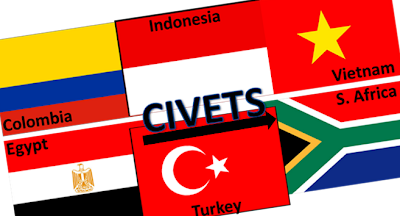Ten years after Brazil, Russia, India and China were dubbed the BRICs, any early mover advantage for investing in them has long gone. But lovers of acronyms will be relieved to learn the latest investment theme claiming to steal a march on emerging markets also has a catchy name
The CIVETS group of countries—Colombia, Indonesia, Vietnam, Egypt, Turkey and South Africa—are being touted as the next generation of tiger economies, even if they are named after a rather more shy and retiring feline. They all have large, young populations, with an average age of 27. This, or so the theory goes, means the countries that make up CIVETS will benefit from fast-rising domestic consumption. They are also all fast-growing, relatively diverse economies, which means, unlike the BRICs, they should be less heavily dependent on external demand
Early numbers suggest that while Colombia, Indonesia, Vietnam, Egypt, Turkey and South Africa make strange bedfellows, CIVETS investors could prosper. Although it was only established in 2007, the S&P CIVETS 60 index is ahead of the S&P BRIC 40 and S&P Emerging BMI over one and three years. While investing in acronyms is not always the most sensible approach, it seems the CIVETS might just pay off
excerpted by SUMPURA Management Consultancy from WSJ
http://online.wsj.com/article/
The CIVETS group of countries—Colombia, Indonesia, Vietnam, Egypt, Turkey and South Africa—are being touted as the next generation of tiger economies, even if they are named after a rather more shy and retiring feline. They all have large, young populations, with an average age of 27. This, or so the theory goes, means the countries that make up CIVETS will benefit from fast-rising domestic consumption. They are also all fast-growing, relatively diverse economies, which means, unlike the BRICs, they should be less heavily dependent on external demand
Colombia
Colombia is emerging as an attractive destination for investors as it works to distance itself from its troubled past. Elected in 2010, President Juan Manuel Santos has continued the center-right policies of former President Alvaro Uribe, prioritizing security and attracting overseas investors. With a population of 46 million, Colombia has substantial oil, coal and natural gas deposits. Other industries include textiles, coffee, nickel and emeralds.
Indonesia
The world's fourth-most populous nation, Indonesia's massive domestic consumer market helped it weather the global financial crisis better than most. Turning in a GDP growth rate of 4.5% in 2009, it bounced back above the 6% mark the following year and is predicted to stay there for the next few years at least. With the lowest unit labor costs in the Asia-Pacific region and a government ambitious to emerge as a credible manufacturing hub it is no surprise some analysts see this country of 240 million people as the next BRIC.
Vietnam
Vietnam has been one of the fastest growing economies in the world for the past 20 years, with the World Bank projecting 6% GDP growth this year rising to 7.2% in 2013. Its population of 90 million and proximity to China have led some analysts to describe it as a potential new manufacturing hub. Cynics suggest Vietnam is better viewed as a holiday destination than an investment opportunity and it is only included within the CIVETS to make the acronym work.
Egypt
Revolution may have put the brakes on the Egyptian economy for the moment, but analysts expect it to regain its growth trajectory as soon as political stability returns. The World Bank is predicting growth of just 1% this year as a consequence of Egypt's part in the Arab Spring. That compares to 5.2% last year and pre-recession levels of 7% or more. But whenever normal business is resumed, Egypt will be in a position to capitalize on its many advantages.
Turkey
Located between Europe and major energy producers in the Middle East, Caspian Sea and Russia, Turkey's growth prospects look strong. The World Bank expects GDP growth of 6.1% this year, falling back to 5.3% in 2013. That said, its economy contracted 4.7% in 2009, revealing its vulnerability to external shocks. Turkey has relatively few natural resources of its own, but it has a diversified economy as well as major natural gas pipeline projects which make it an important energy corridor between Europe and Central Asia.
South Africa
Already the most developed country on the continent by a long way, South Africa has become a diversified economy, being rich in resources like gold and platinum and also attracting manufacturing investment. Rising commodity prices, renewed demand in its automotive and chemical industries and spending on the World Cup have helped South Africa back into growth after it slipped into recession during the global economic downturn. Developed world-standard financial, legal and accounting institutions mean corporate governance is of as high a standard in South Africa as in any other emerging market country. They also make the country a gateway to investment into the rest of Africa.
excerpted by SUMPURA Management Consultancy from WSJ
http://online.wsj.com/article/


No comments:
Post a Comment